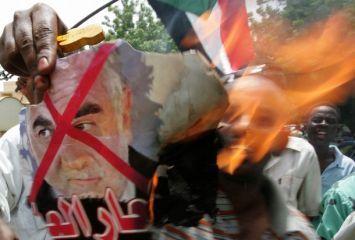Sudan denies three opposition members from attending ICC conference
May 29, 2010 (KHARTUM) — Sudan has banned three opposition members and rights activists from travelling to the Ugandan capital Kampala to attend a conference organized by the International Criminal Court (ICC) to review its statute since its entry into force on 1 July 2002.

The Review Conference to be held from 31 May to 11 June will discuss ways to enlarge the attributions of the permanent tribunal to prosecute individuals accused of war crimes and crimes against humanity. Also it will take stock of its implementation and impact.
The Rome Statute provides that a conference to review the founding treaty to be held seven years after the entry into force in 2002. The 111 State Parties should, among others, debate the definition of war of aggression, and the inclusion of drug trafficking and terrorism in the list of crimes within the court’s jurisdiction.
Sudanese authorities on Saturday morning barred Miriam Al-Mahdi of the Umma Party, Mahmoud Saleh of the Communist Party and Al-Bukhari Aljaali of the Democratic Unionist Party (DUP). Amin Maki Mekki Madani, a rights defender and political activist had to depart in the afternoon but cancelled his trip after the incident.
Miriam Al Sadeq Al-Mahdi said they were on board when the security agents confiscated their passports and asked them to collect it from the headquarters of the National Security and Intelligence Services within a week.
Speaking in a press conference held in Khartoum, Miriam said the ban of travel was regrettable and dangerous adding it intervenes after a series of measures restricting freedoms in the country after “the rigged elections”. She stressed the ICC invited her in her personal capacity and not as member of the opposition Umma led by her father Sadiq Al-Mahdi.
She demanded the security authorities to give them back their passports to catch another plane scheduled to fly to Kampala on Sunday.
Al-Bukhari who is also a professor of International law, criticized the denial of travel saying it was preferable for the security service to discuss their thoughts instead of barring them to travel. He further pointed out they did not coordinated in advance to attend the Review Conference.
The ICC issued three arrest warrants for the Sudanese President Omer Hassan Al-Bashir, a former state minister, Ahmed Haroun and a militia leader Ali Koushaib for crimes against humanity and war crimes in Darfur.
The judges of The Hague based court are currently reviewing whether genocide charges should be added after an appeals chamber in the tribunal said that pre-trial chamber erred in the legal standards they used in deciding to scrap it in the warrant phase against President Bashir.
Earlier this month the ruling National Congress Party had distanced itself from Kampala conference. NCP senior official Ibrahim Ghandour said on May 8, that his government is “not concerned with any conferences or forums held in any country in Africa or the Third World countries,” on the ICC; reminding that Sudan is not a state party of the founding treaty.
“Some circles in the countries of the African continent and the third world are working on the internationalization of local issues and having it monitored through the European courts, which contributes to the weakening of political decisions and local laws limiting the exercise of its work and professionalism” Ghandour further said.
Sudan, after the indictment of Bashir sought to have African countries withdraw from the court but the attempt failed. Later it urged these states to press for amendments to limit the ICC prosecutor’s powers and empower the UN General Assembly to defer the cases for 12 months under Article (16) of the Rome Statute.
Ghandour urged the African signatories meeting in Kampala to review the work of the “unfair practices of the court in Africa”.
He added that that the West is implementing its agenda against African countries and their leaders through the ICC as a new form of neocolonialism noting this serves the goal of undermining the cause of national liberation advocated by some leaders of African States and allowing the court to censor them politically, economically and socially.
The UN Security Council (UNSC) has brushed aside AU request to freeze Bashir’s warrant angering African countries which argued that failing to do so would jeopardize the fragile peace process in Sudan.
However both proposed amendments were dropped from the agenda of the Rome Statute Review conference to be held in Kampala next month.
(ST)

Dinka Boy
Sudan denies three opposition members from attending ICC conference
Why NCP jail Al- Turabi always.?
This NCP under Bashier is a terror.
Bashier must be hand to ICC because he is destroying the country and the lives of Sudanese.